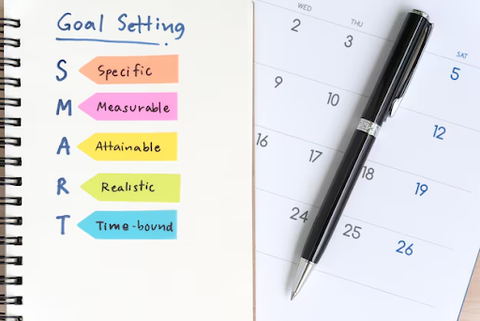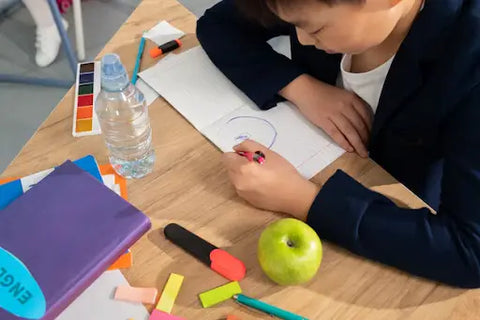Effective study habits are key to doing well in school and growing as a person. When students use good study techniques, they don’t just get better grades—they also learn important skills. Strong study habits can turn studying from a stressful chore into a chance to achieve and grow.
Key Objectives:
- Explore proven study strategies to improve learning and academic performance.
- Provide tips for organizing your study space.
- Offer practical advice on using active learning techniques.
- Present easy-to-implement tips that can be integrated into your daily routine.
1. Set Clear Goals

Setting clear, specific goals is essential for effective studying. Without a clear objective, study sessions can become unfocused and unproductive. For example, instead of a vague goal like “study biology,” a more precise aim, such as “master the key concepts of cellular respiration by the end of this week,”. It helps you stay on track and measure your progress effectively.
Define Objectives
Defining specific goals allows you to channel your efforts more efficiently. When you know exactly what you want to achieve, it’s easier to concentrate on the relevant material and see how well you're doing. Clear goals help you avoid wasting time on unnecessary topics and provide a clear roadmap for your study sessions.
SMART Method
To make your goals more effective, use the SMART method:
- Specific: Your goals should be clear and detailed. For example, “Complete and review Chapter 4 of the math textbook by Friday evening” is more effective than simply “study math.”
- Measurable: Set goals that you can quantify. This allows you to track your progress. For instance, “Finish 30 practice problems in the chemistry workbook” is measurable.
- Achievable: It must be realistic and attainable within your available time and resources. A goal like “Read 50 pages of history notes this weekend” is practical if you have enough time to dedicate.
- Relevant: Align your goals with your overall objectives. For example, as improving your grade in a particular subject or preparing for an upcoming exam.
- Time-bound: Set deadlines to give your goals a sense of urgency. For example, “Prepare for the biology test by revising notes every day this week” helps create a structured timeline.
Track Progress
Monitoring your progress is crucial for staying on track. Use tools like a study journal, digital apps, or progress charts to keep a record of what you’ve accomplished. Regular check-ins, such as reviewing your progress at the end of each week, help you assess how well you're meeting your goals. If you're falling behind or need to change your goals, making adjustments helps you stay focused and do well in your studies.
2. Create a Study Plan

Creating a study plan is a game-changer for academic success. A well-organized study plan not only helps you manage your workload effectively but also prevents procrastination and ensures a balanced approach to studying. Here’s how to create a study plan that works for you:
Develop a Schedule
A structured study schedule is key to managing your study sessions efficiently. By having a set schedule, you can allocate specific times for each subject or task, making it easier to focus on one thing at a time. This approach also helps in tracking your progress and adjusting your plan as needed.
Use tools like calendars, study apps, or planners to design your schedule. For example, you might allocate 30 minutes each day to math, 45 minutes to history, and an hour to science. Make sure to include regular review sessions and stick to the designated times as closely as possible.
Prioritize Tasks
Not all tasks are created equal, so it’s important to identify and prioritize them based on their urgency and importance. Focus on tasks that have deadlines or a significant impact on your grades. For example, studying for an upcoming exam should take over less immediate assignments. Use the Eisenhower Matrix to organize tasks into four groups: urgent and important, important but not urgent, urgent but not important, and neither urgent nor important.
Balance Workload
It's important to balance your study time with breaks and fun activities to prevent burnout and stay productive. Intense study sessions without breaks can lead to fatigue. Incorporating downtime helps keep your mind fresh and improves overall performance.
Schedule regular breaks between study blocks and make time for other hobbies. For instance, after a 45-minute study session, take a 10-15-minute break to stretch or enjoy a snack.
3. Find the Right Study Environment

Creating the right study environment is crucial for enhancing focus and productivity. An ideal study space minimizes distractions and helps you stay organized and motivated. Here’s how to find and set up the perfect study environment:
Choose a Distraction-Free Zone
A distraction-free study environment is essential for maintaining concentration and efficiency. A distraction-free environment is a quiet, well-lit room with few interruptions. It should be separate from places where you relax or have fun, so you can focus better on studying.
If your home has several quiet areas, choose one that is away from common distractions like the TV or kitchen. Consider using noise-canceling headphones to block out background noise if needed. If a dedicated room isn’t available, create a study nook using a corner of a room with good lighting and minimal foot traffic.
Organize Your Space
A well-organized study area can significantly boost your productivity by making it easier to focus on your tasks.
Keeping your study space tidy helps reduce stress and distractions. When everything you need is within reach, you spend less time searching for materials and more time studying effectively.
Use shelves, folders, and desk organizers to keep books, notes, and stationery neatly arranged. Regularly clean your study area to maintain a clutter-free environment. Having a designated place for everything ensures that you can find what you need quickly and efficiently.
Personalize Your Study Space
Making your study area comfortable and motivating helps to improve your focus. Add personal touches such as motivational posters, a comfortable chair, or a desk lamp to make your space more inviting. These elements can make your study sessions more enjoyable and help you stay focused.
Well-designed and personalized study space can improve your focus and efficiency. Make sure the space reflects your style and preferences, and adjust the lighting and seating to suit your needs.
4. Use Active Learning Techniques

Active learning means actively working with the material instead of just reading or listening. This helps you understand better, remember more, and make your study sessions more effective. Here’s how to incorporate active learning into your study routine:
Engage with Material
Active learning means actively interacting with the material you’re studying, which leads to a better grasp and memory of the content. It involves engaging with the content in a way that requires you to think critically and apply what you’ve learned. This method promotes deeper understanding and better retention.
Try making outlines or creating concept maps to visualize relationships between ideas. Talking about topics with classmates or joining study groups can help you understand better by giving you different viewpoints and explanations.
Utilize Study Aids
Study aids are tools that help reinforce learning and make it easier to recall information. Flashcards, diagrams, and mnemonic devices are popular study aids. Flashcards are great for memorizing terms or concepts, diagrams help visualize complex information, and mnemonic devices assist in remembering lists or sequences.
Create flashcards for vocabulary or key concepts and review them regularly. Use mind maps to organize and link information visually. For example, if you’re studying a historical period, draw a mind map connecting major events, figures, and themes.
Practice Teaching
Teaching or explaining things to others helps you understand better and find any gaps in your knowledge. Teaching someone else helps you organize your thoughts and explain things clearly and strengthens your understanding. This method also highlights areas where you might need further review.
Try tutoring a peer or explaining a topic to family members. Alternatively, record yourself explaining a concept and review the recording to identify areas for improvement. This technique not only boosts your comprehension but also builds confidence in your knowledge.
5. Take Regular Breaks

Taking regular breaks is crucial for maintaining focus and productivity during study sessions. Adding breaks helps prevent burnout, and refresh your mind and body, which leads to more effective learning. Here’s how to make the most of your breaks:
Implement the Pomodoro Technique
The Pomodoro Technique is a popular method for managing study time and maintaining focus. The Pomodoro Technique involves working for 25 minutes, followed by a 5-minute break. This method keeps you from getting tired by dividing your study time into short intervals. During breaks, do something relaxing like stretching, having a snack, or taking a short walk to recharge.
Engage in Relaxing Activities
Using breaks to engage in relaxing activities is essential for rejuvenating your mind and body. Regular breaks that include relaxing activities help reduce stress and prevent mental exhaustion. For instance, stretching or taking a brisk walk can help clear your mind and refresh your energy. Choose activities that help you relax and refresh, like mindfulness or deep breathing.
Monitor Energy Levels
Recognizing when you need a break is key to maintaining productivity and avoiding burnout. Pay attention to signs of decreased concentration, mental fatigue, or physical discomfort. These signals indicate that it’s time to take a break to restore your energy and maintain effectiveness. Regularly check in with yourself during study sessions to gauge your focus levels and comfort. If you notice that your concentration is waning or you’re feeling physically tired, it’s a good time to take a break and recharge.
6. Practice Retrieval and Self-Testing

Practicing retrieval and self-testing helps you remember information better and check how well you understand the material. These techniques make studying more effective and prepare you better for exams. Here’s how to incorporate these methods into your study routine:
Test Your Knowledge
Retrieval practice involves actively recalling information rather than passively reviewing notes. This approach strengthens your memory and understanding of the material. Retrieval practice helps reinforce learning by forcing you to retrieve information from memory. This method improves long-term retention and ensures that you understand the material deeply.
Self-testing allows you to evaluate your grasp of the content and identify areas where you might need further review. Use practice quizzes and mock exams to test your knowledge regularly. Create flashcards with key terms or concepts and review them frequently. For example, if you're studying for a history exam, create flashcards with important events and dates, or take online practice quizzes related to the subject.
Review and Reflect
After self-testing, it’s crucial to review your answers and reflect on your performance. Reviewing your answers helps you understand where you made mistakes and how to correct them. Look at your wrong answers to see what went wrong and find extra resources or ask for help to understand difficult topics better. For example, if you had trouble with a quiz question, look up more information or get help to improve your understanding.
Practice Like It's the Real Exam
Practicing under exam conditions helps you manage time better and feel less anxious during real tests. Practicing real exams helps you get used to managing your time and handling test pressure. It can also make you feel less anxious by familiarizing you with the exam format and timing.
Create practice tests that are similar to your real exams. Use a timer to mimic the exam environment and complete the test within the time limit. This will help you see how ready you are and improve your performance on exam day.
7. Use Multiple Resources

Using different study resources can help you understand and remember information better. By combining various materials, checking their quality, and blending insights from different sources, you can get a fuller grasp of your subjects. Here’s how to use diverse resources effectively:
Diversify Study Materials
Using different types of study resources can make learning more interesting and effective. Mixing resources like textbooks, videos, interactive tools, and apps allows you to see concepts from different perspectives. This approach can make learning more engaging and help you understand the material better.
Combine traditional materials (like textbooks) with digital tools (such as educational videos and interactive quizzes). For example, if you're studying biology, read your textbook for detailed information, watch videos for visual explanations, and take quizzes to test your knowledge. Schedule specific times for each resource to ensure a well-rounded study routine.
Evaluate Resource Quality
Choosing high-quality and credible resources is crucial for effective learning. Evaluate study materials based on their reviews, the expertise of the authors, and their alignment with your curriculum. Look for resources authored by experts in the field and those recommended by educators.
Check for positive reviews from other students or educators and ensure that the resource is up-to-date and relevant to your course. For instance, when selecting an online video, verify that it’s produced by a reputable educational channel and aligns with your current syllabus.
Integrate and Compare
Comparing information from multiple sources can help you achieve a more complete understanding of the material.
- Benefits of Comparison: Reviewing and comparing information from various resources helps clarify concepts and address knowledge gaps. This process can also highlight different perspectives and approaches to the same topic, enriching your learning experience.
- Strategies for Integration: As you study, take notes from each resource and compare them to identify key similarities and differences. Use this information to form a more cohesive understanding of the subject. For example, if you're learning about historical events, compare the accounts from different textbooks and videos to gain a fuller picture of the events and their impacts.
8. Stay Healthy

Maintaining your health is crucial for effective learning and academic success. Good physical well-being supports cognitive function, enhances focus, and improves overall performance. Here’s how to prioritize sleep, maintain a balanced diet, and incorporate regular exercise into your routine to stay at your best:
Prioritize Sleep
Adequate sleep is essential for cognitive function, memory consolidation, and overall well-being. Sleep plays a vital role in processing and storing new information. Lack of sleep can impair your ability to concentrate, reduce memory retention, and impact your academic performance. Students must get enough rest to stay alert and engaged during study sessions and exams.
Establish a consistent sleep schedule by going to bed and waking up at the same time each day, even on weekends. Create a restful sleep environment by keeping your bedroom dark, quiet, and cool. Avoid screens and stimulating activities before bed to improve sleep quality.
Maintain a Balanced Diet
A well-balanced diet supports brain health and enhances academic performance. Eating a balanced diet gives your brain the nutrients it needs to work well and keeps your energy up. Important nutrients like omega-3s, antioxidants, and vitamins help improve brain function and mental clarity.
Include different fruits, vegetables, whole grains, and lean proteins in your meals. Foods like blueberries, salmon, nuts, and leafy greens are great for brain health. Try to limit caffeine and sugary snacks, as they can cause energy drops and hurt your focus.
Exercise Regularly
Regular exercise helps both your mind and body, which is important for effective learning. Engaging in regular exercise improves focus, reduces stress, and boosts your mood. Exercise boosts blood flow to the brain, which can improve your thinking and keep you sharp while studying.
Aim for at least 30 minutes of moderate exercise most days of the week. This can include activities like daily walks, workouts, or playing sports. Find an exercise routine that you enjoy and can easily fit into your schedule to make staying active a natural part of your daily life.
9. Seek Feedback and Support

Improving your study habits and grades is easier with feedback and using available resources. Engaging with teachers, peers, and online communities can provide valuable insights and encouragement. Here’s how to effectively seek feedback, join study groups, and utilize online resources to boost your learning experience:
Request Feedback
Getting feedback from teachers, tutors, or peers can show you how well you’re doing and where you need to improve. It helps you see if you understand the material and where you might need to change your study habits. Constructive criticism can help you improve your approach and skills.
Ask your teachers or tutors specific questions about your performance or struggles. Use their feedback to adjust your study methods, work on weak spots, and build on your strengths. Create a plan based on their feedback to track your progress and keep improving.
Join Study Groups
Study groups provide support, motivation, and different perspectives, making learning more collaborative. Working with peers in a study group gives you extra explanations, shared resources, and diverse viewpoints. It makes studying more engaging and less lonely.
Set clear goals and have structured meetings. Share tasks to cover more material and stay focused. Follow guidelines like staying on topic and respecting everyone’s input for effective and supportive sessions.
Utilize Online Resources
Online forums, academic communities, and educational platforms offer valuable support and supplementary materials. Sites like Khan Academy, Coursera, and academic forums give you access to a lot of educational content and expert advice. They can help supplement your learning with additional explanations and practice.
Join online forums to ask questions and connect with others studying the same topics. Look for expert advice or tutorials on YouTube or educational sites for help with difficult subjects. Use these resources for extra practice problems, study guides, and interactive tools.
10. Reflect and Adjust

Effective study habits need regular reflection and adjustments to keep improving. Here's how to do it:
Evaluate Study Habits
Regularly assessing your study habits is crucial to understanding what works and identifying areas for improvement. Regularly reviewing your study habits helps you see what works and what needs improvement. Keep a study journal to track what strategies you use, how focused you are, and your progress. Review this information weekly or monthly to see if you’re retaining information well and identify any challenges
Be Flexible and Adapt
Adapting your study methods based on reflection and changing needs is essential for continuous improvement. Study strategies that worked well at one point may become less effective over time. Being open to change allows you to address new challenges and maintain effective learning practices. Try new study techniques or tools if the old ones aren’t working. For example, switch from flashcards to digital quizzes if needed. Adjust your study plan as your priorities or schedule changes.
Set New Goals
Setting new goals after achieving initial ones helps maintain motivation and drive continued progress. After mastering a specific topic, set a new goal to tackle a more complex area or enhance your skills further. For example, after mastering a math topic, aim for more advanced concepts or tougher problems. Update your study routine with these new goals to maintain progress.
Conclusion
Effective study habits can greatly improve your learning and academic success. Here’s a quick summary of the main tips:
- Set Clear Goals: Use SMART objectives to focus your study sessions and track your progress.
- Create a Study Plan: Make a structured schedule, prioritize tasks, and balance your workload to stay organized.
- Find the Right Study Environment: Choose a distraction-free, organized, and personalized space to boost motivation.
- Use Active Learning Techniques: Engage with the material through active methods, study aids, and teaching concepts.
- Take Regular Breaks: Use techniques like the Pomodoro Technique, relax, and monitor your energy to stay focused.
- Practice Retrieval and Self-Testing: Test yourself to review your knowledge and simulate exam conditions.
- Use Multiple Resources: Diversify your materials and integrate insights from different sources to improve understanding.
- Stay Healthy: Prioritize sleep, a balanced diet, and regular exercise to support your well-being and performance.
- Seek Feedback and Support: Get feedback, join study groups, and use online resources for extra support and perspectives.
- Reflect and Adjust: Regularly review and adjust your study habits and set new goals to keep improving.
Using these tips can transform your study routine and enhance your performance. Experiment with these strategies, see what works best for you, and make adjustments as needed. For more help, explore additional resources and courses linked below. Embrace these strategies to improve your study habits and achieve academic success.


















